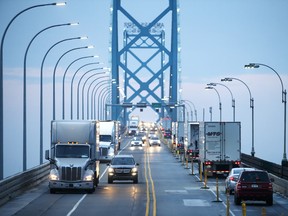The rules of global finance are being rewritten and Tiff Macklem intends to be a part of it
Article content
The Great Recession inspired so much fear that the world’s economic powers came together under the banner of the Group of 20 to confront it. By contrast, COVID-19 caused those same countries to turn inward. The pandemic was global, but the responses have been local.
Advertisement
This advertisement has not loaded yet, but your article continues below.
Article content
Does the G20 even still meet? Maybe no one cares, but we probably should. Canada does better when the world’s bullies agree to down swords and respect a common set of rules and norms. Think back to 2008 and 2009. A smallish country’s banking system, apparently the soundest in the world, was still at the mercy of whatever shenanigans they were getting up to in the world’s major financial centres.
Canada has never really had the economic clout necessary to make people take notice, and it’s been a long time since we spent enough on the military to be of much help on security matters. But Ottawa has a tradition of sending technocrats out into the world to help keep the international conversation going, contributing ideas and/or time to efforts that have little direct connection to their day jobs.
Advertisement
This advertisement has not loaded yet, but your article continues below.
Article content
This is especially true of central bankers. David Dodge, who led the Bank of Canada from 2001 to 2008, tried to focus global policy-makers on the massive current-account deficit in the United States, and its equally destabilizing flip side, the massive surpluses in Asia. (If only they had listened.)
More recently, Mark Carney, another former governor, led the Financial Stability Board as it rewrote global banking rules after the Great Recession. Carolyn Rogers, the Bank of Canada’s incoming senior deputy governor, is finishing a stint as secretary general of the Basel Committee on Banking Supervision before officially starting her new job in December.
Tiff Macklem, the current governor, last week signalled his intention to keep up the tradition. His comments on growth and inflation received all the attention, but those remarks came after he delivered a speech that had nothing to do with the unemployment rate or supply-chain bottlenecks. The parochialism and short-term orientation of the financial press was on full display, as every question, including mine, was related to Canada’s immediate economic concerns. The conversation that Macklem wanted to have was bigger.
Advertisement
This advertisement has not loaded yet, but your article continues below.
Article content
-

IMF cuts Canada’s growth forecast for this year, trims view on global rebound amid ‘dangerous divergence’
-

Bank of Canada’s 2% inflation target should stay as is, Canadians tell Trudeau
-

Stagflation debate is just a ‘massive distraction,’ RBC’s Porcelli says
Advertisement
This advertisement has not loaded yet, but your article continues below.
Article content
There are reasons such countries are losing faith. So many goods and services are priced in U.S. dollars that a weaker currency won’t necessarily make a county’s exports more competitive, at least right away. But imports would become more expensive, putting upward pressure on inflation, and weakening the ability of a floating exchange rate to help a country absorb a downturn. A series of crises since the 1990s has also demonstrated the value of having a treasury stuffed with foreign-exchange reserves.
Still, market-based exchange rates can help policy-makers get things right over the longer term because they send important price signals. Macklem wants the IMF to update its thinking about currencies to keep developing economies from abandoning all commitment to a free-market approach. That means making room for “managed floating exchange rates,” but offering advice on how that can be done without causing strain on a global system based on traders, not technocrats, setting exchange rates.
“The system needs guardrails to make sure currency intervention does not get in the way of needed relative price adjustments,” Macklem said. “Such an agreed-upon framework could guide managed floating exchange rate regimes to make sure they do not stall adjustment in the medium to long run.”
It’s not the kind of initiative that makes for a good headline, which is why the press went for inflation last week. But it deserves attention all the same. The rules of global finance are being rewritten and Macklem intends to be a part of it.
• Email: kcarmichael@postmedia.com | Twitter: carmichaelkevin
Advertisement
This advertisement has not loaded yet, but your article continues below.
Macklem aims to take bigger role on world stage after year of putting out fires at home
2021-10-12 21:13:07






